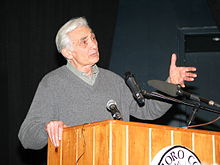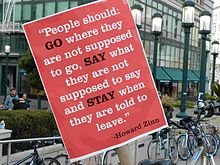Howard Zinn
This is an accepted version of this page Progressive Era Repression and persecution Anti-war and civil rights movements Contemporary Howard Zinn (August 24, 1922 – January 27, 2010)[1] was an American historian, playwright, philosopher, socialist intellectual and World War II veteran.
[8] During the Great Depression, his father worked as a ditch digger and window cleaner, and for a brief time, his parents ran a neighborhood candy store, barely earning a living.
[8] Howard Zinn studied creative writing at Thomas Jefferson High School in a special program established by principal and poet Elias Lieberman.
[15] On a post-doctoral research mission nine years later, Zinn visited the resort near Bordeaux where he interviewed residents, reviewed municipal documents, and read wartime newspaper clippings at the local library.
On the ground, Zinn learned that the aerial bombing attacks in which he participated had killed more than a thousand French civilians as well as some German soldiers hiding near Royan to await the war's end, events that are described "in all accounts" he found as "une tragique erreur" that leveled a small but ancient city and "its population that was, at least officially, friend, not foe."
[16] Zinn wrote: I recalled flying on that mission, too, as deputy lead bombardier, and that we did not aim specifically at the 'Skoda works' (which I would have noted, because it was the one target in Czechoslovakia I had read about) but dropped our bombs, without much precision, on the city of Pilsen.
Rivers and Zinn were among a group of faculty members who in 1979 defended the right of the school's clerical workers to strike and were threatened with dismissal after refusing to cross a picket line.
The book depicts the struggles of Native Americans against European and U.S. conquest and expansion, slaves against slavery, unionists and other workers against capitalists, women against patriarchy, and African-Americans for civil rights.
The film, narrated by Zinn, includes performances by Matt Damon, Morgan Freeman, Bob Dylan, Bruce Springsteen, Eddie Vedder, Viggo Mortensen, Josh Brolin, Danny Glover, Marisa Tomei, Don Cheadle, and Sandra Oh.
He participated in the Civil Rights Movement and lobbied with historian August Meier[34] "to end the practice of the Southern Historical Association of holding meetings at segregated hotels.
The program had been endorsed by the SNCC in December 1963 and was envisioned by Zinn as having a curriculum that ranged from novels to books about "major currents" in 20th-century world history, such as fascism, communism, and anti-colonial movements.
The local newspaper, the Hattiesburg American, described the SNCC volunteers in town for the voter registration drive as "outside agitators" and told local blacks "to ignore whatever goes on, and interfere in no way..." At a mass meeting held during the visit to Hattiesburg, Zinn and another SNCC representative, Ella Baker, emphasized the risks that went along with their efforts, a subject probably in their minds since a well-known civil rights activist, Medgar Evers, had been murdered getting out of his car in the driveway of his home in Jackson, Mississippi, only six months earlier.
As a consequence, Zinn recommended approaching Mississippi Governor Ross Barnett and President Lyndon Johnson to request protection for the young civil rights volunteers.
[41] Zinn collaborated with historian Staughton Lynd mentoring student activists, among them Alice Walker,[42] who would later write The Color Purple, and Marian Wright Edelman, founder and president of the Children's Defense Fund.
Edelman identified Zinn as a major influence in her life and, in the same journal article, tells of his accompanying students to a sit-in at the segregated white section of the Georgia state legislature.
As Zinn described[45] in The Nation, though Spelman administrators prided themselves for turning out refined "young ladies", its students were likely to be found on the picket line, or in jail for participating in the greater effort to break down segregation in public places in Atlanta.
In an article on the civil rights movement in Albany, Zinn described the people who participated in the Freedom Rides to end segregation, and the reluctance of President John F. Kennedy to enforce the law.
[47] Zinn said that the Justice Department under Robert F. Kennedy and the Federal Bureau of Investigation, headed by J. Edgar Hoover, did little or nothing to stop the segregationists from brutalizing civil rights workers.
[49] His second book, The Southern Mystique,[50] was published in 1964, the same year as his SNCC: The New Abolitionists in which he describes how the sit-ins against segregation were initiated by students and, in that sense, were independent of the efforts of the older, more established civil rights organizations.
In the opinion of Noam Chomsky, The Logic of Withdrawal was Zinn's most important book: He was the first person to say—loudly, publicly, very persuasively—that this simply has to stop; we should get out, period, no conditions; we have no right to be there; it's an act of aggression; pull out.
[58] Along with Noam Chomsky, Zinn edited and annotated the copy of The Pentagon Papers that Senator Mike Gravel read into the Congressional Record and that was subsequently published by Beacon Press.
[61] Zinn testified as an expert witness at Ellsberg's criminal trial for theft, conspiracy, and espionage in connection with the publication of the Pentagon Papers by The New York Times.
Zinn's testimony on the motivation for government secrecy was confirmed in 1989 by Erwin Griswold, who as U.S. solicitor general during the Nixon administration sued The New York Times in the Pentagon Papers case in 1971 to stop publication.
[63] Griswold persuaded three Supreme Court justices to vote to stop The New York Times from continuing to publish the Pentagon Papers, an order known as "prior restraint" that has been held to be illegal under the First Amendment to the U.S. Constitution.
[72] He observed that it is not unusual for prominent professors such as Zinn to weigh in on current events, citing a resolution opposing the war in Iraq that was recently ratified by the American Historical Association.
[92] In July 2013, the Associated Press revealed that Mitch Daniels, when he was the sitting Republican Governor of Indiana, asked for assurance from his education advisors that Zinn's works were not taught in K–12 public schools in the state.
"[94] In one of the emails, Daniels expressed contempt for Zinn upon his death:[95] This terrible anti-American academic has finally passed away...The obits and commentaries mentioned his book, A People's History of the United States, is the 'textbook of choice in high schools and colleges around the country.'
If it is, how do we get rid of it before more young people are force-fed a totally false version of our history?At the time the emails were released, Daniels was serving as the president of Purdue University.
Wineburg acknowledged that A People's History of the United States was an important contribution for overlooked alternative perspectives, but criticized the book's coverage of the mid-thirties to the Cold War.
[103] Michael Kazin, professor at Georgetown University and co-editor of the leftist magazine Dissent,, praised Zinn's A People's History of the United States for its dramatic condemnation of the exploitation of the masses by an elite few, and for its lavish use of quotes from social rebels and revolutionaries, though he describes it as somewhat simplified.


